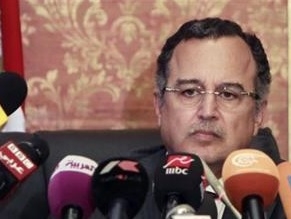|
World Jewish News

Egypt's new Freign Minister, Nabil Fahmy, warned on Sunday against the ''internationalisation" of a crisis he described as Egypt's internal affair and criticised the "silence" of foreigners on attacks he blamed on the Mu
|
Egypt rejects EU warning, insists crisis is ‘internal affair’
19.08.2013, Israel and the World Egypt rejected a warning by European Union leaders that the EU will "urgently review" its aid to the country against a background of mounting international concern about the deteriorating situation and the huge loss of life in the last few days.
Egyptian Foreign Minister Nabil Fahmy in the interim governmentwarned on Sunday against the "internationalisation" of a crisis he described as Egypt's internal affair and criticised the "silence" of foreigners on attacks he blamed on the Muslim Brotherhood.
Reflecting a defiant official mood in Cairo, Fahmy ignored a public statement by the British foreign secretary, William Hague, who sought to strike a careful balance by condemning the "disproportionate use of force by the security forces or violent actions by some demonstrators". The statement was issued after the two men spoke on Saturday night, the Foreign Office said.
On Sunday, in a joint statement, the presidents of the European Commission and the European Council,n JoseManuel Barroso and Herman Van Rompuy said the EU will “urgently review” its relations with Egypt, warning the Egyptian authorities there that the people’s calls for democracy and fundamental rights “cannot be disregarded, much less be washed away in blood.”
They said it’s the responsibility of the Egyptian army and the interim government to end the violence and to embark on a political dialogue to swiftly restore democracy.
Nearly 900 people have died over the week in clashes between security forces and Muslim Brotherhoofd supporters of ousted Islamist President Mohammed Morsi.
“The violence and the killings of these last days cannot be justified nor condoned,” said Barroso and Van Rompuy.
Top EU diplomats meet Monday in Brussels to discuss possible EU actions in response to the crisis in Egypt – including reviewing financial aid to the country - and prepare an expected emergency meeting of EU Foreign Ministers. The EU and its member states last year pledged a combined 5 billion euros ($6.7 billion) in loans and aid for Egypt, contingent on the progress toward democracy.
Israel fears for security, peace treaty in Egypt crisis
Israeli officials are pressing Washington and European capitals not to withdraw support from the Egyptian military, fearing the descent of the country into chaos, according a report in the New York Times.
The paper quoted an Israeli official saying, “We’re trying to talk to key actors, key countries, and share our view that you may not like what you see, but what’s the alternative?” The official told the paper, “At this point, it’s army or anarchy.”
The Israeli cabinet held an urgent meeting on Friday to review the situation in Egypt, but ministers and officials have kept a strict official silence, not wanting to be seen as interfering in Egypt’s internal affairs.
Israel has maintained close cooperation with the Egyptian military since the ousting of President Mubarak in 2010, even during the period of Morsi’s presidency. Israel and the Egyptian military have clear shared interests in containing radical Jihadist activity in the Sinai which has been a base of attacks against both Egyptian military and infrastructure targets and Israel, as well as providing a staging ground for armed groups from the Gaza Strip. Violence in the Sinai is also costing the Egyptian economy heavily in lost revenue from tourism. Israel has repeatedly allowed Egypt to deploy additional forces in the Sinai, which according to the peace agreement is supposed to be demilitarised.
by: Yossi Lempkowicz
EJP
|
|
